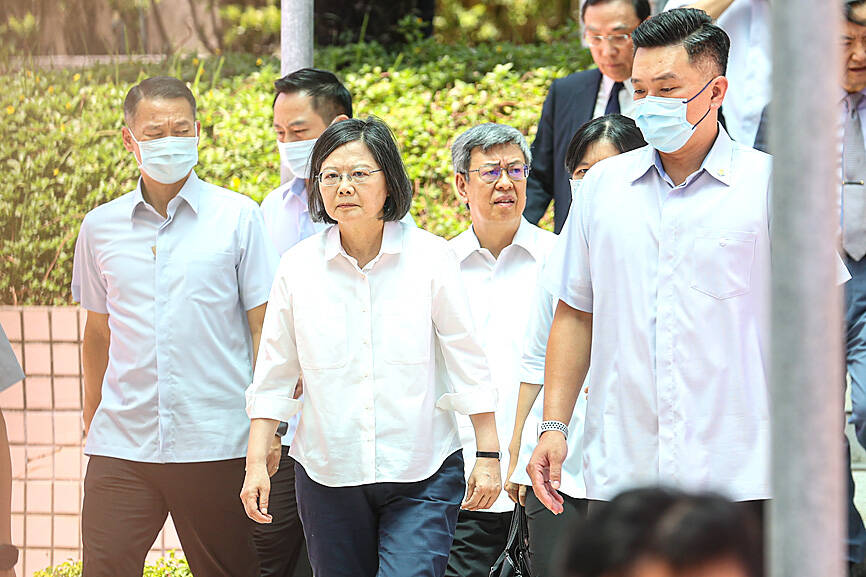On the 36th anniversary of the lifting of martial law, President Tsai Ing-wen (蔡英文) yesterday spoke of learning from the past to achieve reconciliation while visiting a former military prison in New Taipei City’s Sindian District (新店) where many political prisoners were incarcerated under martial law.
The former prison is now the Sindian Drug Abuser Treatment Center managed by the Ministry of Justice.
Tsai said the site was used for a long time as a military prison and is among Taiwan’s 42 “Historical Sites of Injustice.”

Photo: CNA
Lei Chen (雷震), a political activist and publisher of the influential Free China (自由中國) magazine in the 1950s, was incarcerated at the prison, as well as Huang Hsin-chieh (黃信介), Yao Chia-wen (姚嘉文) and Chang Chun-hung (張俊宏), leaders of Taiwan’s early democracy movement who were imprisoned in the 1979 Formosa Incident, Tsai said.
“These Taiwanese democracy pioneers were incarcerated here, but they never wavered and did not submit to the authoritarian regime, despite having to endure much suffering,” Tsai said.
“The Historic Sites of Injustice aim to remind people of our shared past, as well as the need to safeguard the democracy and freedom we enjoy today,” she added.
Tsai urged government agencies to promote transitional justice and to think of creative ideas to preserve the historic sites for educational purposes.
“This is the way to achieve justice and achieve reconciliation, for Taiwan to emerge from the dark shadows of the past,” she said.
Taiwan would work to become “the beacon of democracy and human rights” in Asia, Premier Chen Chien-jen (陳建仁) said at the event.
“Taiwan’s freedom, democracy, and rule of law all came from the sacrifices and relentless struggle of the early democracy activists,” he said. “Therefore our government must promote transitional justice.”
The government would preserve historical documents and political files, and work to identify the perpetrators of historic atrocities, he added.

Alain Robert, known as the "French Spider-Man," praised Alex Honnold as exceptionally well-prepared after the US climber completed a free solo ascent of Taipei 101 yesterday. Robert said Honnold's ascent of the 508m-tall skyscraper in just more than one-and-a-half hours without using safety ropes or equipment was a remarkable achievement. "This is my life," he said in an interview conducted in French, adding that he liked the feeling of being "on the edge of danger." The 63-year-old Frenchman climbed Taipei 101 using ropes in December 2004, taking about four hours to reach the top. On a one-to-10 scale of difficulty, Robert said Taipei 101

Nipah virus infection is to be officially listed as a category 5 notifiable infectious disease in Taiwan in March, while clinical treatment guidelines are being formulated, the Centers for Disease Control (CDC) said yesterday. With Nipah infections being reported in other countries and considering its relatively high fatality rate, the centers on Jan. 16 announced that it would be listed as a notifiable infectious disease to bolster the nation’s systematic early warning system and increase public awareness, the CDC said. Bangladesh reported four fatal cases last year in separate districts, with three linked to raw date palm sap consumption, CDC Epidemic Intelligence

US climber Alex Honnold left Taiwan this morning a day after completing a free-solo ascent of Taipei 101, a feat that drew cheers from onlookers and gained widespread international attention. Honnold yesterday scaled the 101-story skyscraper without a rope or safety harness. The climb — the highest urban free-solo ascent ever attempted — took just more than 90 minutes and was streamed live on Netflix. It was covered by major international news outlets including CNN, the New York Times, the Guardian and the Wall Street Journal. As Honnold prepared to leave Taiwan today, he attracted a crowd when he and his wife, Sanni,

Taiwanese and US defense groups are collaborating to introduce deployable, semi-autonomous manufacturing systems for drones and components in a boost to the nation’s supply chain resilience. Taiwan’s G-Tech Optroelectronics Corp subsidiary GTOC and the US’ Aerkomm Inc on Friday announced an agreement with fellow US-based Firestorm Lab to adopt the latter’s xCell, a technology featuring 3D printers fitted in 6.1m container units. The systems enable aerial platforms and parts to be produced in high volumes from dispersed nodes capable of rapid redeployment, to minimize the risk of enemy strikes and to meet field requirements, they said. Firestorm chief technology officer Ian Muceus said